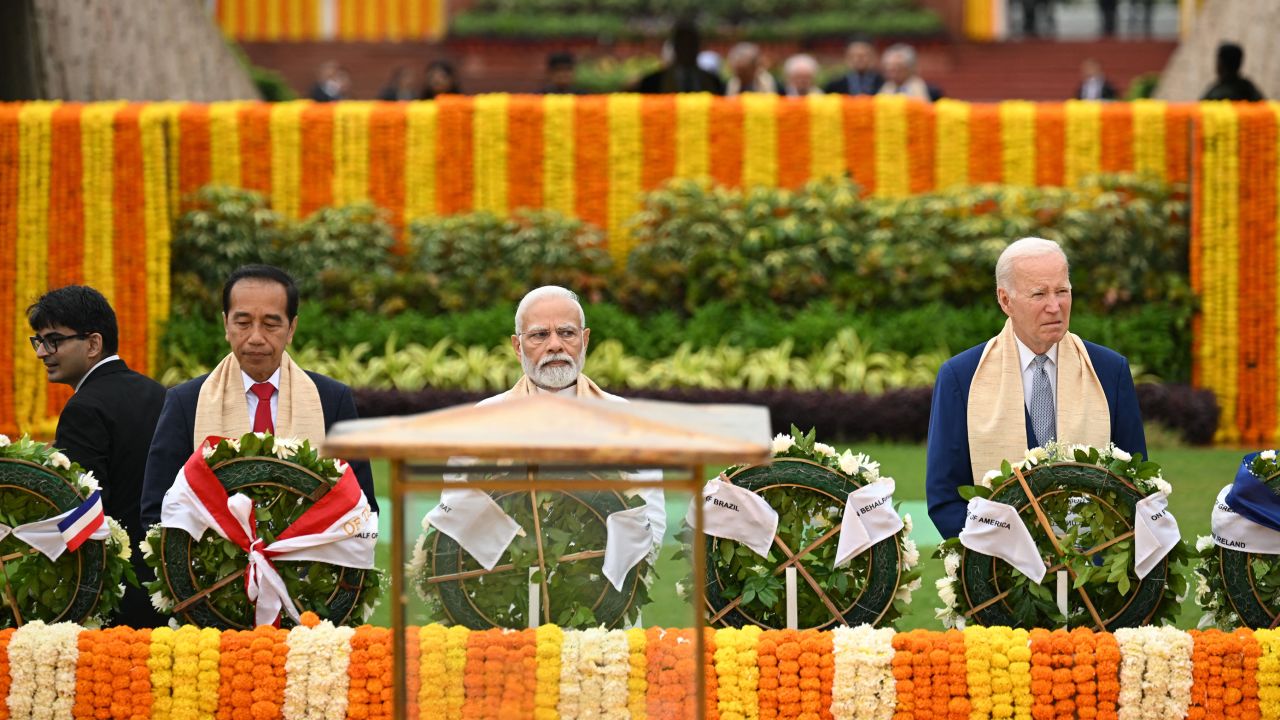CNN —
Narendra Modi’s decision to gift world leaders a hand spun scarf in New Delhi on Sunday was an act rooted in history and symbolism for the Indian prime minister, as he aimed to spotlight the country’s freedom movement on the global stage.
As leaders of the Group of 20 (G20) nations walked into the Rajghat memorial for Mohandas K. Gandhi, India’s beloved father of independence who was assassinated in 1948, they were greeted with khadi scarves, a key symbol of his non-violent resistance campaign that helped win India’s independence from British colonial rule.
Modi was seen draping the handwoven, off-white cotton material around the necks of US President Joe Biden and British Prime Minister Rishi Sunak, among others, posing for photos in front of a large backdrop of the Sabarmati Ashram in the state of Gujarat, one of the many residences Gandhi held across India.
For Gandhi, a man who has become a global icon of peace and non-violence, khadi scarves were an emblem of self reliance, an item of clothing that could be made locally by Indians, and designed to boycott imported or British-made products during India’s colonial rule.
It showed Indians that they were capable of growing their industrial potential, freeing the country from depending on its erstwhile colonial governors.
Gandhi often weaved his own khadi clothing on a charkha, or spinning wheel, a device that has come to symbolize the country’s political and economic emancipation.
At Rajghat on Sunday, world leaders gathered in silence with the scarves around their necks, standing in front of a raised marble platform, built to mark the spot of Gandhi’s cremation.
“As diverse nations converge, Gandhi Ji’s timeless ideals guide our collective vision for a harmonious, inclusive and prosperous global future.” Modi wrote on X, formerly known as Twitter, on Sunday.

Within the country, Gandhi’s legacy has left an indelible mark on Indian culture. His face is printed on every Indian rupee notes, while buildings, museums, streets and landmarks are routinely named after him.
But while Modi made Gandhi an integral part of the G20 summit this weekend, the freedom fighter’s legacy within Modi’s own Bharatiya Janata Party (BJP) remains complicated.
The BJP has its roots in the Rashtriya Swayam Sangh (RSS), a prolific Hindu-nationalist organization that counts Modi among its members.
The RSS adheres to Hindutva, an ideology that favors the country’s majority Hindus and has expressed favor for a vision of an explicitly Hindu state, instead of the secular one Gandhi envisaged and helped create.
When India won its independence from the British in 1947, right-wing Hindu nationalists rallied for the carving of British India into two separate states: Hindu-majority India and Muslim-majority Pakistan. Gandhi, on the other hand, was against the country’s partition, instead advocating for a united India of all faiths.
Less than a year later, Gandhi was assassinated by Nathuram Godse, a former RSS member. And in recent years, there has been a growing fringe movement that worships the assassin, seeking to rehabilitate his image as a Hindu nationalist icon.
At the same time, the BJP and its supporters have been accused of downplaying the legacy of India’s first prime minister, Jawaharlal Nehru, a longtime Gandhi admirer and ally.
Modi has condemned Godse’s worship and continuously praised and paid his respect to Gandhi, both inside and outside of India.
But opposition politicians called out Sunday’s memorial service for what they said was a double standard.
“Every RSS-BJP worker must watch this video. Your hero, Nathuram Godse, killed Mahatma Gandhi,” wrote the newly formed INDIA alliance, a group of political parties that have come together to unseat Modi in next year’s general election, on social media.
“For decades, you propagated falsehoods against Gandhi Ji. You yourselves are filled with hatred towards him and continue to diminish his contributions and spread lies about him.”


